President for life
President for life is a title assumed by or granted to some leaders to remove their term limit irrevocably as a way of removing future challenges to their authority and legitimacy. The title sometimes confers on the holder the right to nominate or appoint a successor. The usage of the title of "president for life" rather than a traditionally autocratic title, such as that of a monarch, implies the subversion of liberal democracy by the titleholder (although republics need not be democratic per se). Indeed, sometimes a president for life can proceed to establish a self-proclaimed monarchy, such as Jean-Jacques Dessalines and Henry Christophe in Haiti.

Similarity to a monarch
A president for life may be regarded as a de facto monarch. In fact, other than the title, political scientists often face difficulties in differentiating a state ruled by a president for life (especially one who inherits the job from a family dictatorship) and a monarchy – indeed, Samoa's long-serving President for life, Malietoa Tanumafili II, was frequently and mistakenly referred to as King. In his proposed plan for government at the United States Constitutional Convention Alexander Hamilton proposed that the chief executive be a governor elected to serve for good behavior, acknowledging that such an arrangement might be seen as an elective monarchy. It was for that very reason that the proposal was rejected. A notable difference between a monarch and a president-for-life, is based on the fact that the successor of the president do not necessarily possess a for-life term, like in Turkmenistan.
Most leaders who have proclaimed themselves president for life have not in fact successfully gone on to serve a life term. Most have been deposed long before their death while others truly fulfill their title by being assassinated while in office. However, some have managed to rule until their (natural) deaths, including José Gaspar Rodríguez de Francia of Paraguay, Alexandre Pétion of Haiti, Rafael Carrera of Guatemala, François Duvalier of Haiti, Josip Broz Tito of Yugoslavia, and Saparmurat Niyazov of Turkmenistan. Others made unsuccessful attempts to have themselves named president for life, such as Zaire's Mobutu Sese Seko in 1972.[1]
People frequently cited as being examples of Presidents for Life include very long-serving authoritarian presidents such as Zaire's Mobutu, North Korea's Kim Il-sung, Bulgaria's Todor Zhivkov, Romania's Nicolae Ceaușescu, Syria's Hafez al-Assad, Indonesia's Suharto, Taiwan's Chiang Kai-shek, Iraq's Saddam Hussein, Russia's Vladimir Putin, China's Xi Jinping, and Belarus' Alexander Lukashenko.[2] However, they were never officially granted life terms and, in fact, underwent periodic renewals of mandate that were usually sham elections.[3][4][5] Official results showed these presidents receiving implausibly high levels of support (in some cases, unanimous support).[6][7]
In popular culture
In the film Escape from LA, the President played by Cliff Robertson is given a life term by a constitutional amendment after an earthquake ravages Los Angeles and leads to the President's shocking electoral victory. At the end of the film, Snake played by Kurt Russell puts an end to his regime when he uses an EMP aiming device remote ending all governments including that of his dictatorship.
Most notable
Julius Caesar
One of the most well-known incidents of a republican leader extending his term indefinitely was Roman dictator Julius Caesar, who made himself "Perpetual Dictator" in 45 BC. Traditionally, the office of dictator could only be held for six months, and although he was not the first Roman dictator to be given the office with no term limit, it was Caesar's dictatorship that inspired the string of Roman emperors who ruled after his assassination.
Napoleon Bonaparte
Caesar's actions would later be copied by the French Consul Napoleon Bonaparte, who was appointed "First Consul for life" in 1802 before elevating himself to the rank of Emperor two years later. Since then, many dictators have adopted similar titles, either on their own authority or having it granted to them by rubber stamp legislatures.
Adolf Hitler
Adolf Hitler was appointed Chancellor of Germany by President Paul von Hindenburg in January. On Hindenburg's death the German Reichstag voted to (unconstitutionally) merge the offices of President and Chancellor, giving Hitler the title of Führer. Later the Reichstag voted to allow Hitler to hold the positions of Chancellor and Führer for life.
North Korea
After Kim Il-sung's death in 1994, the North Korean government wrote the presidential office out of the constitution, declaring him "Eternal President" in 1998 in order to honor his memory forever. Since there can be no succession in a system where the President reigns over a nation beyond death, the powers of the president are nominally split between the president of the Supreme People's Assembly, the premier, and the chairman of the National Defence Commission (as State Affairs Commission since 2016). However, Kim Il-sung's son and grandson have been in control of the country since his death (Kim Jong-il from 1994 until his death in 2011, and Kim Jong-un since 2011) as the leaders of the ruling Workers' Party of Korea.
China
In March 2018, China's party-controlled National People's Congress passed a set of constitutional amendments including removal of term limits for the president and vice president, the creation of a National Supervisory Commission, as well as enhancing the central role of the Communist Party of China.[8][9] On 17 March 2018, the Chinese legislature reappointed Xi as president, now without term limits; Wang Qishan was appointed vice president.[10][11] The following day, Li Keqiang was reappointed premier and longtime allies of Xi, Xu Qiliang and Zhang Youxia, were voted in as vice-chairmen of the state military commission.[12] Foreign minister Wang Yi was promoted to state councillor and General Wei Fenghe was named defence minister.[13]
According to the Financial Times, Xi expressed his views of constitutional amendment at meetings with Chinese officials and foreign dignitaries. Xi explained the decision in terms of needing to align two more powerful posts—General Secretary of the Communist Party of China and Chairman of the Central Military Commission (CMC)—which have no term limits. However, Xi did not say whether he intended to serve as party general secretary, CMC chairman and state president, for three or more terms.[14]
List of leaders who became president for life
Note: The first date listed in each entry is the date of proclamation of his status as President for Life.
| Portrait | Name | Title | Took office | Left office | Notes |
|---|---|---|---|---|---|
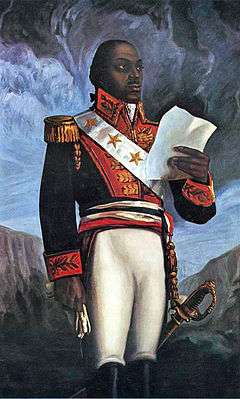 | Toussaint Louverture | Governor for Life of Saint-Domingue | 1801 | 1802 | Deposed 1802, died in exile in France 1803. |
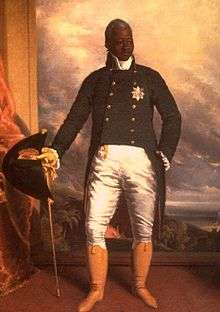 | Henri Christophe | President for Life of the State of Haiti (Northern) | 1807 | 1811 | Became King 1811, committed suicide in office 1820. |
| José Gaspar Rodríguez de Francia | Perpetual Supreme Dictator of Paraguay | 1816 | 1840 | Died in office 1840. | |
.jpg) |
Alexandre Pétion | President for Life of Haiti (Southern) | 1816 | 1818 | Died in office 1818. |
 | Jean-Pierre Boyer | President for Life of Haiti | 1818 | 1843 | Became President for Life immediately upon assuming the office because Alexandre Pétion's constitution provided for a life presidency for all his successors, deposed 1843, died 1850. |
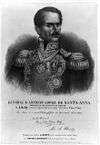 | Antonio López de Santa Anna | President for Life of Mexico | 1853 | 1855 | Resigned 1855, died 1876. |
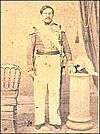 | Rafael Carrera | President for Life of Guatemala | 1854 | 1865 | Died in office 1865. |
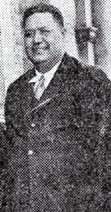 | Tupua Tamasese Meaʻole | O le Ao o le Malo for Life of Samoa | 1962 | 1963 | Died in office 1963, elected to serve alongside Tanumafili II (see below). The position of O le Ao o le Malo (head of state) is ceremonial; executive power is exercised by the Prime Minister, and Samoa is a parliamentary democracy.[15] |
| Malietoa Tanumafili II | O le Ao o le Malo for Life of Samoa | 1962 | 2007 | Died in office 2007, elected to serve alongside Meaʻole (see above).[15] | |
 | Sukarno | Supreme Commander, Great Leader of Revolution, Mandate Holder of the Provisional People's Consultative Assembly, and President for Life of Indonesia | 1963 | 1966 | Designated as President for Life according to the Ketetapan MPRS No. III/MPRS/1963,[16] life term removed 1966, deposed 1967, died under house arrest 1970. |
.jpg) | Kwame Nkrumah | President for Life of Ghana | 1964 | 1966 | Deposed 1966, died in exile in Romania 1972. |
.jpg) | François "Papa Doc" Duvalier | President for Life of Haiti | 1964 | 1971 | Died in office 1971, named his son as his successor (see below).[17] |
.jpg) | Jean-Claude "Baby Doc" Duvalier | President for Life of Haiti | 1971 | 1986 | Named by his father as successor (see above), deposed 1986, died 2014. |
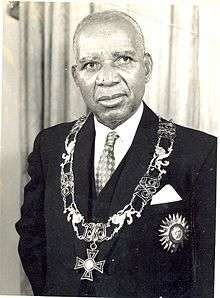 | Hastings Banda | President for Life of Malawi | 1971 | 1993 | Life term removed 1993, voted out of office 1994, died 1997. |
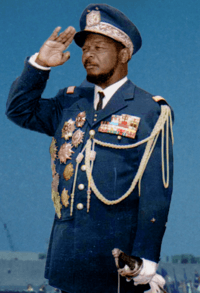 | Jean-Bédel Bokassa | President for Life of the Central African Republic | 1972 | 1976 | Became Emperor 1976, deposed 1979, died 1996. |
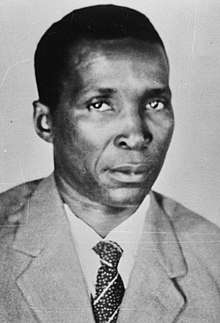 | Francisco Macías Nguema | President for Life of Equatorial Guinea | 1972 | 1979 | Deposed and executed 1979. |
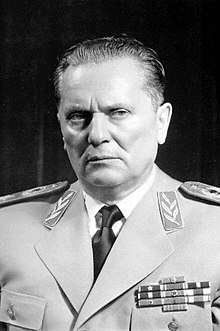 | Josip Broz Tito | President for Life of Yugoslavia | 1974 | 1980 | Appointed as President for Life according to the 1974 Constitution, died in office 1980. |
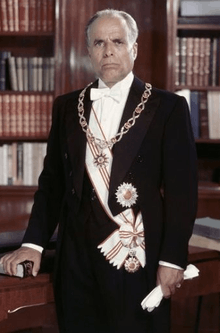 | Habib Bourguiba | President for Life of Tunisia | 1975 | 1987 | Deposed 1987, died under house arrest 2000. |
%2C_R23930288.jpg) | Idi Amin | President for Life of Uganda | 1976 | 1979 | Deposed 1979, died in exile in Saudi Arabia 2003. |
| Lennox Sebe | President for Life of Ciskei | 1983 | 1990 | Deposed 1990, died 1994. | |
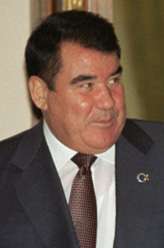 | Saparmurat Niyazov | President for Life of Turkmenistan | 1999 | 2006 | Died in office 2006. |
References
- Crawford Young and Thomas Turner, The Rise and Decline of the Zairian State, p. 211
- "Editorial: BELARUS DEMOCRACY ACT". Voice of America. October 26, 2004. Archived from the original on May 8, 2020. Retrieved May 8, 2020.
Lukashenko will become president for life.
- Snyder, Timothy. The Road to Unfreedom: Russia, Europe, America. p. 43. ISBN 9780525574460. Archived from the original on April 12, 2018. Retrieved April 12, 2018.
- Chivers, C.J. (February 8, 2008). "European Group Cancels Mission to Observe Russian Election, Citing Restrictions". The New York Times. Archived from the original on January 31, 2019. Retrieved January 31, 2019.
- Kara-Murza, Vladimir Vladimirovich. "As the Kremlin Tightens the Screws, It Invites Popular Revolt". Spotlight on Russia. World Affairs Journal. Archived from the original on July 24, 2017. Retrieved July 24, 2017.
- "Russia". Freedom in the World 2020. Freedom House. 2020. Retrieved May 9, 2019.
Kremlin is able to manipulate elections and suppress genuine dissent.
- "Belarus". Freedom in the World 2020. Freedom House. 2020. Retrieved May 9, 2019.
Belarus is an authoritarian police state in which elections are openly rigged and civil liberties are curtailed. [...] Organization for Security and Co-operation in Europe (OSCE) monitors noted that longstanding deficiencies in Belarusian elections were unaddressed, including a restrictive legal framework, media coverage that fails to help voters make informed choices, irregularities in vote counting, and restrictions on free expression and assembly during the campaign period. The group concluded that the elections fell considerably short of democratic standards.
- Shi, Jiangtao; Huang, Kristin (26 February 2018). "End to term limits at top 'may be start of global backlash for China'". South China Morning Post. Archived from the original on 27 February 2018. Retrieved 28 February 2018.
- Phillips, Tom (4 March 2018). "Xi Jinping's power play: from president to China's new dictator?". The Guardian. Archived from the original on 4 March 2018. Retrieved 4 March 2018.
- Wen, Philip (17 March 2018). "China's parliament re-elects Xi Jinping as president". Reuters. Archived from the original on 17 March 2018. Retrieved 17 March 2018.
- Bodeen, Christopher (17 March 2018). "Xi reappointed as China's president with no term limits". Associated Press. Archived from the original on 17 March 2018. Retrieved 17 March 2018.
- Zhou, Xin (18 March 2018). "Li Keqiang endorsed as China's premier; military leaders confirmed". South China Morning Post. Archived from the original on 27 August 2019. Retrieved 7 September 2019.
- Ng, Teddy (19 March 2018). "China's foreign minister gains power in new post as state councillor". South China Morning Post. Archived from the original on 5 March 2019. Retrieved 7 September 2019.
- Mitchell, Tom (7 September 2019). "China's Xi Jinping says he is opposed to life-long rule". Financial Times. Archived from the original on 17 April 2018. Retrieved 17 April 2018.
President insists term extension is necessary to align government and party posts
- "Constitution of the Independent State of Western Samoa 1960". University of the South Pacific. Archived from the original on 8 July 2007. Retrieved 28 December 2007.
- "Ketetapan MPRS No. III/MPRS/1963". hukumonline.com.
- The Oxford Encyclopedia of African Thought: Abol-impe. Oxford University Press. 2010-01-01. p. 328. ISBN 9780195334739.
Further reading
- Mngomezulu, Bhekithemba Richard (2013). The President for Life Pandemic: Kenya, Zimbabwe, Nigeria, Zambia and Malawi. Adonis & Abbey Publishers Ltd. ISBN 9781909112315.
External links
- The List: Presidents for Life // Foreign Policy, November 5, 2007